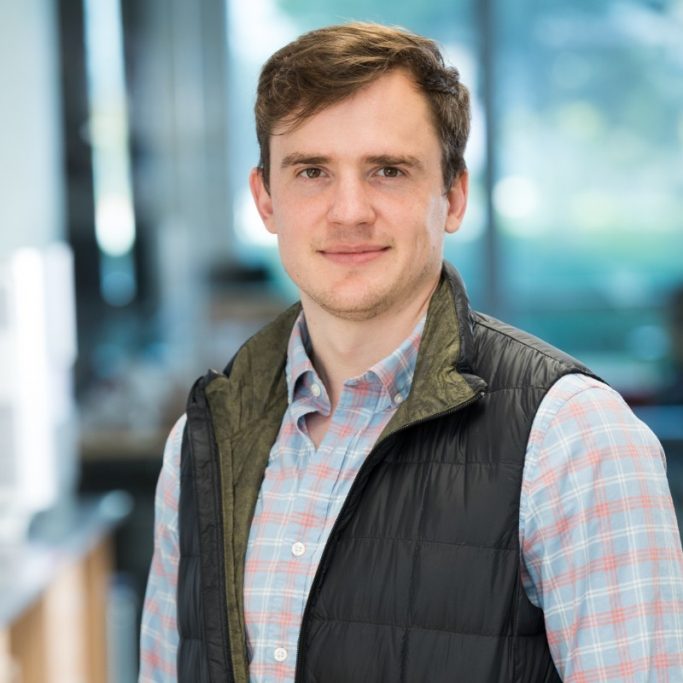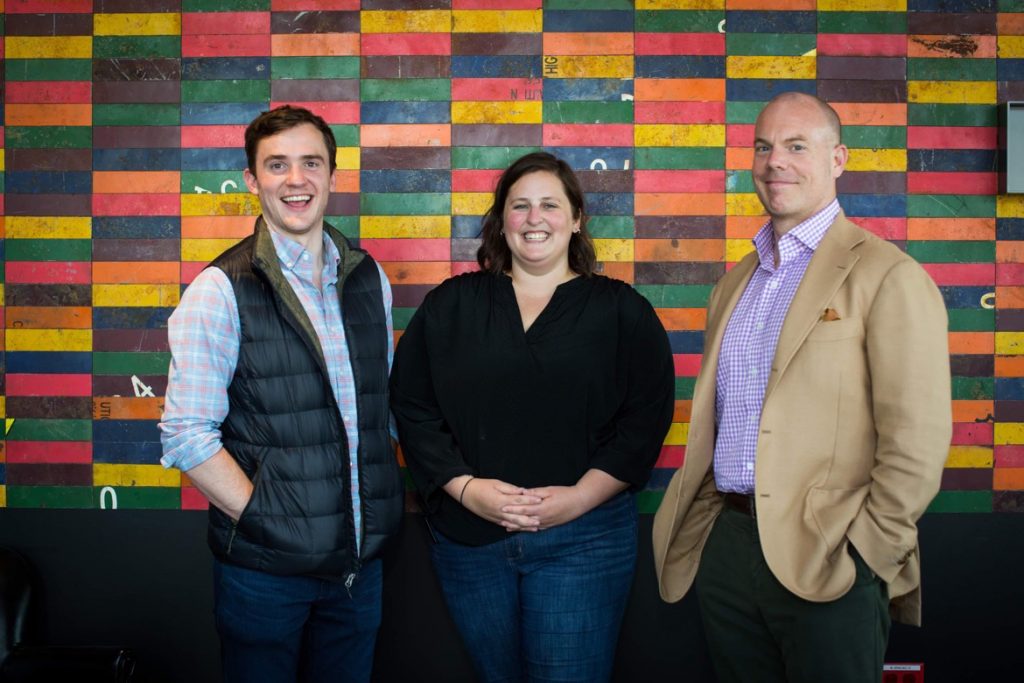Scientist Transforms Research into Life-Changing Therapeutics
By: Jeff Joiner | August 10, 2022

Jackson Brougher PhD’22 completed his doctorate in May, but before finishing the degree he was already leading the research efforts of a new pharmacology startup he co-founded as the company’s chief science officer. Brougher shakes his head when he thinks about the whirlwind of life changes that he’s been through in just the last couple of years, but he is quick to credit faculty, colleagues and his training at The University of Texas at Dallas for preparing the way.
“I’ve always had the dream of being a scientist and doing what I’m doing now, and it’s still just wild to me how this opportunity just kind of fell into my lap,” Brougher said.
Brougher’s passion for science combined with a keen grasp of entrepreneurial innovation led him to be invited to join the venture called Doloromics. The company is developing novel drug treatments based on UT Dallas research that could help people who suffer from chronic pain but face limited treatment options.
Brougher earned his PhD at the School of Behavioral and Brain Sciences, where he studied with Dr. Catherine Thorn, investigating how learning-related neural activity supports motor learning and behavioral performance improvement. Brougher published his research in a scientific journal for the first time while working in Thorn’s lab.
“When you see your name on the top of that first publication you feel an immense sense of calm,” Brougher said. “Finally, after months of peer review and editing, your publication is out in the world and it’s time to actually show others what you’ve done.”
A native of Georgetown, Texas, Brougher and his family have deep ties to North Texas and UT Dallas. His grandfather, John R. Brougher, went to work for a fledgling Texas Instruments in 1955 after serving in World War II and studying electrical engineering at The University of Texas in Austin. He became vice president of TI’s calculator manufacturing group, and from his grandmother, Patricia Brougher, Brougher heard about his grandparents attending holiday parties at the homes of TI founders who also established the Graduate Research Center of the Southwest (later to become UT Dallas) in 1961.
After graduating from high school, Brougher chose to study neuroscience at the University of Aberdeen in Scotland, where he received a Master of Science, which in the United Kingdom is an integrated five-year undergraduate and master’s degree. As part of his studies, he also spent time working in a pharmacology lab at the University of Tübingen in Germany.
“I chose to study abroad because I was curious and wanted to see the world,” he said. “Science, like most other things, has become incredibly more international and I loved working on interdisciplinary cross-cultural teams in the lab that exposed me to a wider range of viewpoints.”
When it came to choosing a PhD program, Brougher returned home to Texas where UT Dallas’ strong science and research foundation, and particularly strong neuroscience programs, attracted him. Another draw for Brougher was UTD’s strong focus on translating research into commercial products.

Not long after arriving on the UT Dallas campus to begin his doctorate in 2018, Brougher and his fellow PhD students were addressed by Dr. Ted Price BS’97, director of the Pain Neurobiology Research Laboratory in the School of Behavioral and Brain Sciences. Price encouraged the young scientists to consider the practical value of research spun off into startup companies and fueled by private investment, something he is well known for.
“It instantly clicked with me,” Brougher said. “Dr. Price talked about his past startups and how as we develop our academic skill sets this is something we should consider.”
Pain research in Price’s UT Dallas lab became the foundation of the startup Doloromics, founded by Price and his former student, Dr. Candler Paige PhD’21, along with Dr. Chris Flores. Paige, CEO of Doloromics, invited Brougher to join the venture as a founding partner.
“We were PhD students at the same time, and I knew he was a fantastic neuroscientist,” Paige said. “He’d given department talks where it was clear he was a thoughtful, skilled scientist. In addition to being a great scientist, I knew Jackson was a good person. The advice everyone gives when thinking about founding a company with someone is to make sure you’re willing to work with that person every day for the next 10 years. Ted Price and I both knew we’d be okay with that person being Jackson.”
Doloromics (the name is a combination of the Latin word dolor, meaning pain, and -omics, referring to the company’s computational platform) is working to develop precise drug targets to treat chronic pain without using opiates that have led to an epidemic of prescription drug addiction in the United States.
“Opiates mask the symptoms of pain but don’t directly target the underlying mechanisms of what’s causing pain,” Brougher said. “We’re focusing on what causes certain sensory neurons in the peripheral nervous system, known as nociceptors, to be hypersensitized to stimuli that typically wouldn’t result in you feeling pain.”
Brougher is studying the transcriptome in human tissue, which is the total of all RNA genes expressed. A huge amount of data is collected through gene sequencing and analyzed to identify the mechanisms of pain behind specific sensory neurons. According to Brougher, these transcriptomic profiles will allow for the development of drug therapies focused on individual types of sensory neurons.
“Every sensory neuron plays a different role in your sensory perception of the world,” Brougher said. “When we want to target a set population of nociceptors (a type of sensory neurons) we can look at novel drug targets to dampen the activity of only targeted nociceptors without the opiate effect of dampening nontarget receptors.”
Brougher said an example is peripheral neuropathy causing hypersensitivity to cold often suffered by people undergoing chemotherapy. A targeted therapy could dampen the peripheral neuropathic pain without turning off peripheral sensitivity all together.
“Jackson has single-handedly grown our platform, DOLOReS, from a good concept into an unstoppable tool,” Paige said. “He’s sequenced millions of cells, something almost no one else in the world can say, and processed that data in a record amount of time. He’s been instrumental in identifying novel therapeutic targets, and then validating them in an in vitro screening platform he single-handedly built.”
In 2020, Doloromics was one of only a handful of companies in the world accepted into a startup accelerator begun by the California genetics technology company Ilumina, which Brougher describes as the Microsoft of the gene sequencing world. The Illumina Accelerator gave the infant Doloromics access to seed funding, use of the company’s sequencing equipment and lab space in San Francisco that made possible Doloromics’ early work in transcriptomic analysis.
Doloromics has now graduated from the accelerator and established its new lab in Menlo Park, California, in the heart of Silicon Valley and the San Francisco Bay area. Initially employing just the four founders, the company is expanding its research efforts and hiring staff and laboratory scientists. They are now working on attracting the next round of investment funding.
“We’re talking to other pharmaceutical companies and looking at which of those companies would be best for us to potentially partner with on a few of our other targets that we may not be able to fully develop in-house,” Brougher said.
And as if working as the chief science officer for a new company wasn’t enough, Brougher finished his PhD while kicking off Doloromics’ research in California and he got married. The last few years have been a whirlwind, but it’s been an experience, as a scientist and an entrepreneur, that Brougher said he absolutely loves.
“Now I’m sitting in our office here at Doloromics and right outside is our lab, which is wild,” he said. “Every morning I walk up and unlock the door and I’m in this space that I helped create. It’s a struggle sometimes, but I love proposing crazy ideas to potential investors and some of those people look you in the eye and your crazy idea clicks with them and they’re like, ‘Yes, I’m on board!’”